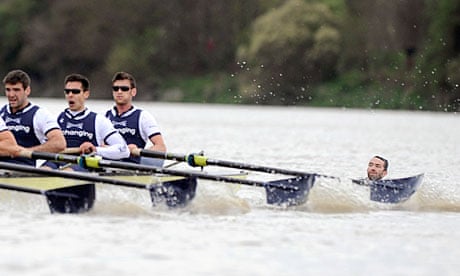Security chiefs and police can never completely remove the possibility that "one idiot" could cause major distruption to an event in the London 2012 Games, the British Olympic Association chairman has warned, after a protester's dip in the Thames forced the Boat Race to be temporarily halted.
Speaking hours after Trenton Oldfield, a 35-year-old man who swam into the paths of the boats during Saturday's race, was charged with a public order offence, Colin Moynihan said that "every conceivable scenario" of security threat was being reviewed by the organisers of this summer's Games. But he admitted it would be impossible to definitively rule out all threats.
"It just takes, and is likely to be, one idiot," he told BBC Radio 5 Live. "It's not likely to be a well-orchestrated campaign through Twitter or websites. It is likely to be someone similar to the idiot yesterday who causes major disruption. That is why all the security measures need to be put in place to minimise the chance of that happening."
Moynihan, who as cox for Great Britain's men's rowers won an Olympic silver medal at the 1980 Moscow Games, added: "You can never completely remove it but you can do everything possible to protect the interests of the athletes by minimising it."
Scotland Yard said Oldfield, of Whitechapel, east London, was held at Chiswick police station before being released on bail on Saturday night. He will appear at Feltham magistrates court on Monday 23 April charged with a Section 5 offence under the Public Order Act.
Oldfield, a former student of contemporary urbanism at the London School of Economics, came close to the crews' oars as he swam between the boats between the two and three-mile marker. He had written on his blog that his stunt was "a protest, an act of civil disobedience, a methodology of refusing and resistance".
He added: "This act has employed guerrilla tactics. I am swimming into the boats in the hope I can stop them from completing the race and proposing the return of surprise tactics. This is 'peaceful' … I have no weapons (don't shoot!) My only fear, is not swimming fast enough to get in the right position."
However his anti-elitist stance went unappreciated by members of the crews – one of whom, William Zeng, posted on Twitter a series of remarks denouncing Oldfield as "a mockery of a man". He wrote: "When I missed your head with my blade I knew only that you were a swimmer, and if you say you are a protester then no matter what you say your cause may be, your action speaks too loudly for me to hear you. I know … exactly what you were protesting. You were protesting the right of 17 young men and one woman to compete fairly and honorably, to demonstrate their hard work and desire in a proud tradition. You were protesting their right to devote years of their lives, their friendships, and their souls to the fair pursuits of the joys and the hardships of sport. You, who would make a mockery of their dedication and their courage, are a mockery of a man."
Cambridge emerged the eventual winners of the 158th race, restarted after Oldfield's intervention. There was no presentation ceremony, and the Oxford crew faced further anguish when bowman Alexander Woods was rushed to hospital after collapsing in the boat after passing the finishing line. A statement from the Boat Race Company said the 27-year-old was in a stable condition and looked set to make a full recovery.
Race umpire John Garrett, who halted the race after the four-time Olympic champion Sir Matthew Pinsent spotted Oldfield in the water, said organisers of the Boat Race had been taken unawares by the intervention. "Last year there was the possibility of swimmers in the water and we discussed it," he told BBC Sport. "This year it was not something we were expecting at all."
David Searle, chief executive of the Boat Race Company, has defended the organisation of the event, pointing out its susceptiblity to disruption. He told the Sunday Times: "There is little we could have done to stop this type of action. We could not have boats patrolling in front of the two crews, let alone beside them, because of the wash that would have affected the actual rowing of the crews. Events such as this are vulnerable."
Speaking of security at the 2012 Olympics, Moynihan said security and the protection of the athletes and the public was "in many respects the biggest ask".
"It is a major challenge and the government have been aware of this since day one and work closely with Locog [the Olympic organising committee]. Every conceivable scenario is being reviewed and I'm confident no more can be done. It's not impossible but it is a major challenge. You can never get it perfect unless you remove all the crowds and nobody is going to dream of doing anything like that."



